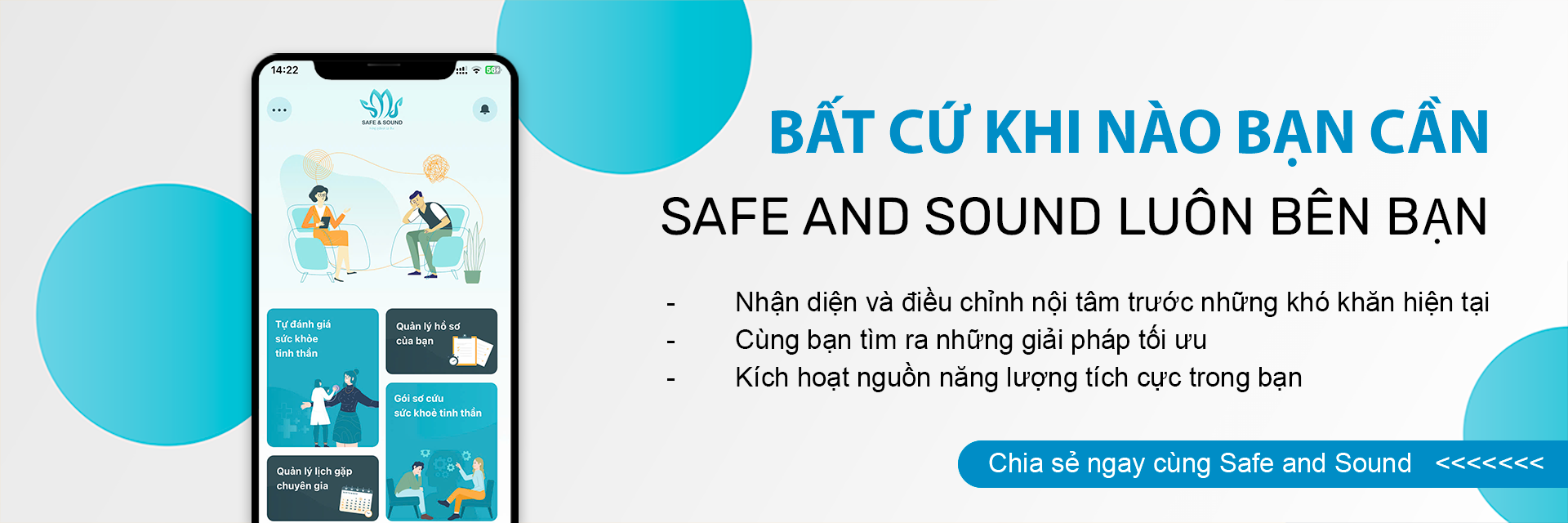Early Signs of Depression in College Students You Shouldn’t Ignore | Safe and Sound
The early stages of depression are the ideal time for effective psychological intervention and support. However, this is the stage that is most easily overlooked by students due to the vague initial signs and subjective psychology, not realizing the changes in themselves. This article will help you identify the early signs of depression, thereby taking timely action to protect your mental health.
Nguyen Thi Mai Anh | Bachelor of Psychology - Applied mental health care
Institute of Medical Technology Applications
1. Why do students easily ignore signs of depression?

Students easily ignore early signs of depression
- Subjective psychology
When symptoms such as sadness, fatigue or insomnia appear, many students think that it is a temporary consequence of psychological pressure and exams. Thoughts such as "I will be fine after a sleep", "I will be fine after the exam" or "Everyone feels depressed" make it easy for them to ignore abnormal signs of mental health. Instead of listening to themselves, many students choose to ignore or try to endure. It is this subjective mentality that causes signs of depression to not be detected and intervened in time, leading to more serious consequences later.
- Fear of being judged, afraid to share
Many students, despite feeling mentally unstable, choose to remain silent. They often worry that sharing their true feelings will make others think they are weak, overreacting, or seeking attention. This fear of being misunderstood or judged causes many students to suffer silently, missing out on timely support that could help them improve their mental health before things get worse.
- Lack of mental health knowledge
In addition to psychological barriers, many students lack basic knowledge about mental health. They do not know that symptoms such as constant fatigue, loss of interest in studying, loss of appetite or withdrawal from social relationships can be early signs of depression. Instead, these states are often considered normal reactions to exam pressure or stress in life. According to psychologists, not recognizing the difference between normal stress and mental disorders causes many students to miss the early intervention period - the most important stage for effective recovery.
2. Early warning signs of depression in students
- Find it difficult to wake up every morning
It is quite common for students to like to sleep in or lie lazily in bed, especially after stressful days of studying. However, if this situation occurs regularly and you find it difficult to get out of bed every morning, but not because of sleepiness, but because of lack of energy and motivation, this could be an early sign of depression. Depression is often accompanied by a feeling of prolonged fatigue and loss of interest in daily activities. Even simple things like getting ready for school or eating breakfast can become a burden. If you find yourself often delaying starting a new day, this sign should not be taken lightly.

Difficulty waking up is an important sign of depression.
- Change of taste
Depression can affect eating habits in a variety of ways. Some students may eat more than usual as a temporary fix, while others may lose their appetite completely. If you find yourself skipping meals, having poor appetite, or overeating when you are not hungry, this could be a sign of depression.
- Disturbed sleep
According to psychologists, depression often leads to a marked change in sleeping habits. This is shown by sleeping unusually much, students spend most of their time in bed as a way to escape reality, avoid negative emotions or simply because they always feel tired. On the contrary, there are also people who have difficulty sleeping, often tossing and turning, having difficulty falling asleep or waking up in the middle of the night and not being able to fall back asleep. These disorders can make psychological problems worse: lack of sleep increases anxiety, irritability and reduces the ability to concentrate. The cycle of anxiety and insomnia, if prolonged, will make you more exhausted both mentally and physically. Therefore, paying attention to changes in sleep is an important step in recognizing early signs of depression.
- Prolonged feeling of frustration, mood swings
Students may experience mood swings, from being angry one minute to crying the next or completely silent and empty. These emotions can flare up over the smallest things, or even for no apparent reason. If you find yourself irritable, constantly feeling frustrated for no apparent reason, or experiencing mood swings for days in a row, these could be signs of depression. Psychologists advise that these changes should not be ignored, especially when they begin to affect relationships, learning and daily activities.
- Difficulty connecting and feeling joy
One of the most obvious signs of depression in students is a loss of interest in things that used to bring them joy. Hobbies, favorite activities, and previously close relationships gradually become unfamiliar and faded. Participating in social activities, studying, or simply chatting with friends and family also becomes difficult. Many students begin to withdraw, talk less, and gradually isolate themselves from those around them. When feelings of emptiness and disconnection persist, it can be a sign of a serious psychological problem.
- Thoughts of self-deprecation, withdrawal, and self-neglect appear.
According to psychologists, an early sign of depression is the persistent appearance of negative thoughts about oneself. Students may begin to feel useless, unworthy or without a future. This is accompanied by a tendency to withdraw, avoid social contact, not wanting to talk to friends or participate in daily activities. Some people may cry frequently, be more emotional than usual and gradually neglect self-care. Even small things become overwhelming and cause anxiety.
3. How to self-monitor and assess early signs of depression
- Keep a mood diary or use an app to track your mental health
One of the important steps to help students identify mental health problems early is to track their emotions and mental state daily. Recording emotions can help you review changes in sleep, energy levels or stressful situations. This habit not only helps increase self-awareness but also helps detect early signs of persistent abnormalities. In addition, you can use applications that support mental health monitoring, providing periodic assessments. This is a useful tool for students to proactively observe their mental health, thereby deciding when to seek support from psychological experts.
See also: Safe and Sound: Helping you overcome psychological difficulties comprehensively
- Consult relatives and friends about unusual changes in yourself
When it comes to self-monitoring your mental health, your loved ones can act as a “mirror” of your own state. When you’re too busy or used to dealing with negative emotions, it’s easy to miss small changes in your behavior, mood, or communication style. So, it’s important to proactively share with a trusted friend and ask for their feedback if you notice any changes, such as being quieter, more tired, or avoiding social activities. People close to you are often more likely to notice changes, even small ones, and their feedback can help you identify problems early.

Students can ask friends and relatives about early signs of depression.
- When you suspect signs of depression, consider it an important signal.
One of the common mistakes students make is waiting until they can no longer bear it before seeking help. However, the earlier you detect mental and physical health problems, the better your chances of recovery. Even if you just feel “something is wrong,” lose interest in things you used to love, or have trouble sleeping for no apparent reason, these are signs worth paying attention to. Instead of trying to endure or ignore them, use that doubt as a reminder to listen to yourself and consider seeking professional help.
Safe and Sound Clinic - Family health and psychological support
With a team of experienced doctors and specialists, Safe and Sound Clinic is a pioneer in comprehensive health care with health care services from medicine to psychology.
“Early prevention - Timely support - Long-term companionship”.
.png)
If you have any doubts or experience any physical or mental health problems, please contact HOTLINE 0964 778 911 (Phone/Zalo, 24/7) for answers and support as soon as possible!
HOW TO MAKE AN APPOINTMENT for online or in-person consultation with an expert
- At SnS Clinic - IMT Institute
- Or download and schedule a consultation on the Safe and Sound app to manage and track your schedule anytime, anywhere.
Safe and Sound (SnS) - Institute of Applied Medical Technology (IMT)
See also:
What should you keep in mind when going to see a doctor for depression?



